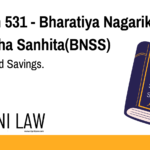Code
Section 146 – Unlawful Compulsory Labour
Whoever unlawfully compels any person to labour against the will of that person,
shall be punished with imprisonment of either description for a term which may extend to one
year, or with fine, or with both.
Explanation
Section 146 of the Bharatiya Nyaya Sanhita, 2023 (BNS) ensures protection against forced labour, reinforcing an individual’s right to work voluntarily. This provision is aimed at preventing exploitation where a person is compelled to work against their will without lawful justification.
Key Elements of Section 146 BNS
- Unlawful Compulsion: The person must have been forced to work.
- Against Free Will: The labour must have been performed without consent.
- Punishment:
- Imprisonment of up to one year, or
- Fine, or
- Both.
Legal Perspective
This section aligns with Article 23 of the Indian Constitution, which prohibits forced labour, human trafficking, and begar (unpaid work under coercion). It also supports the Bonded Labour System (Abolition) Act, 1976, reinforcing the criminalization of forced labour practices.
Illustration
Example 1: Forced Labour in a Factory
A factory owner forces workers to continue working beyond their shift without consent and threatens them with consequences if they refuse. This would be a violation of Section 146 BNS.
Example 2: Domestic Forced Labour
A domestic worker is forced to work for an employer without wages and under threats. If reported, the employer can be punished under Section 146 BNS.
Example 3: Begar System (Unpaid Work Under Coercion)
A landlord forces a tenant’s family to work in their fields without payment as a condition of staying on the land. This is illegal under this section.
Common Questions and Answers on Section 146 BNS
1. What is the punishment for unlawful compulsory labour?
The punishment includes imprisonment for up to one year, a fine, or both, as per judicial discretion.
2. How is forced labour identified under the law?
Forced labour is identified when a person is compelled to work against their will through threats, coercion, or without proper compensation.
3. Does Section 146 cover bonded labour?
Yes, it supports the abolition of bonded labour, and cases can also be registered under the Bonded Labour System (Abolition) Act, 1976.
4. Can forced labour cases be reported anonymously?
Yes, anyone can report a case of forced labour anonymously to the police, labour departments, or human rights organizations.
5. What is the relation between Section 146 BNS and Article 23 of the Indian Constitution?
Article 23 of the Constitution prohibits forced labour and human trafficking, while Section 146 BNS criminalizes it, ensuring punishment for offenders.
Conclusion
Section 146 BNS plays a crucial role in protecting individuals from exploitation in work environments. It ensures that no person can be unlawfully forced to work against their will, promoting labour rights and justice.
For more legal insights, visit ApniLaw today! 🚀








